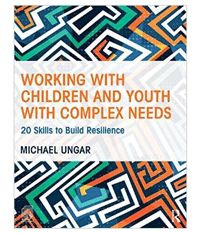“Working with Children and Youth with Complex Needs: 20 Skills to Build Resilience”

“Working with Children and Youth with Complex Needs: 20 Skills to Build Resilience”
By Michael Ungar
Routledge
New York, N.Y., 2015
Book focuses on treatment from social ecological angle
Reviewed by James K. Luiselli, Ed.D., ABPP, BCBA-D
Psychologist Michael Ungar is a proponent of multi-systemic treatment in working with children and families “exposed to high levels of stress,” and confronted with “extremely adverse living conditions.”
His clinical focus encompasses the areas of posttraumatic stress disorder, delinquency, drug addiction, child abuse and neglect and related conditions. This exceptional book advances our knowledge about treating the most impoverished populations from the widest social ecological perspective.
The following quote summarizes Ungar’s orientation: “Too often, we assume individuals who are exposed to problems beyond their control can make meaningful changes in behavior while still living in social environments that remain toxic.” How, he asks, will an anxious child have less anxiety while still living in a violent housing project?
Similarly, can we expect a child to stop running away from the domestic violence he witnesses on a daily basis? And what about foster parents being able to financially support a child with physical disability?
A social ecological approach, Ungar argues, is the only way to adequately address these questions. His 20 skills to build resilience are directed at helping professionals in building “the capacity of individuals to navigate their way to the psychological, social, cultural, and physical resources that sustain their well-being.” The many skills he references are presented in both separate chapters and within individual chapters that integrate related competencies.
For example, one chapter is devoted to helping clients navigate the complex system of external resources within schools, community agencies, self-help groups, advocacy organization, and the like.
Other chapters deal with educating professionals about the skills needed to teach clients how to negotiate critical services. It takes dedicated reading to fully appreciate the scope and breadth of this material, which emphasizes the competence of professionals, the resources required to actually produce change and the confirmatory research support.
Thankfully, Ungar adopts a consistent chapter format, starting with introductory comments, followed by one or more case studies, further thematic elaboration and a closing summary.
The case studies depict dialogue between a counselor and client, including clever side-bars that illustrate the particular therapeutic skills being called upon. The chapters also condense some of the narrative sections into helpful tables such as “Questions to Help People Negotiate” and “Principles for a Social Ecological Practice.” On whole, the chapters are dense with thoughtful recommendations and advice.
Perhaps the best way to describe the content of this book is Ungar’s pronouncement that “changes to children’s social ecologies can have a greater impact on psychological and behavioral outcomes than focused interventions on children themselves, especially for children who face more severe challenges.” Although some readers may contest his conclusion, my experiences tell me that he is on the money. The evidence support he presents is also demonstrably persuasive.
“Working with Children and Youth with Complex Needs” is a unique blend of techniques, didactic discourse, subtle nudging, problem solving and self-expression from a remarkably insightful therapist-academic-researcher-writer. I have long been a fan of social ecological intervention as the basis for improving the lives of profoundly needy children and families. This book is the best of its kind and at the top of my list of suggested readings for mental health and social services professionals.
James K. Luiselli, Ed.D., ABPP, BCBA-D, is Chief Clinical Officer, Clinical Solutions, Inc. and North East Educational and Developmental Support Center, Tewksbury, Mass..
Learn more about the book: Working with Children and Youth with Complex Needs: 20 Skills to Build Resilience
